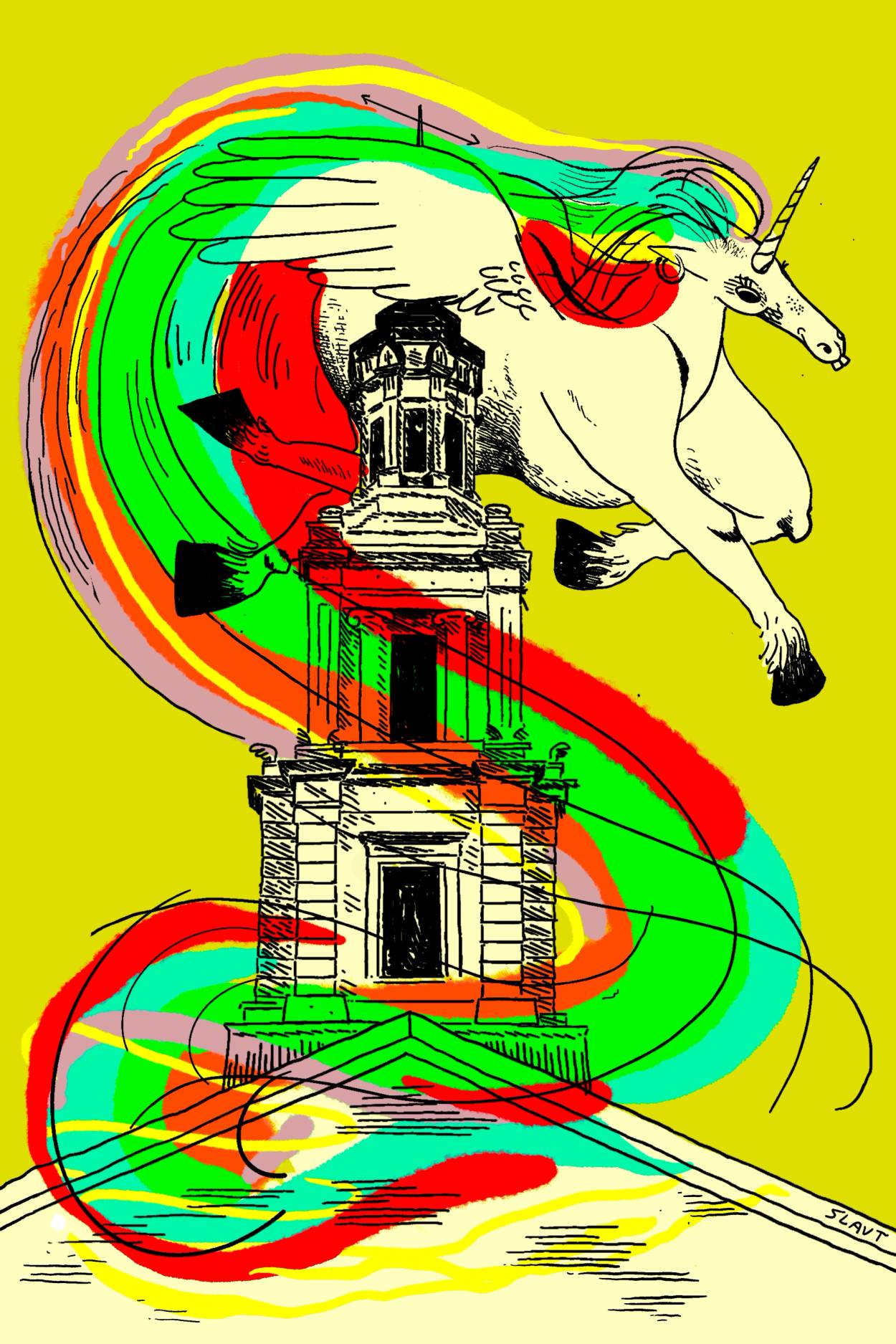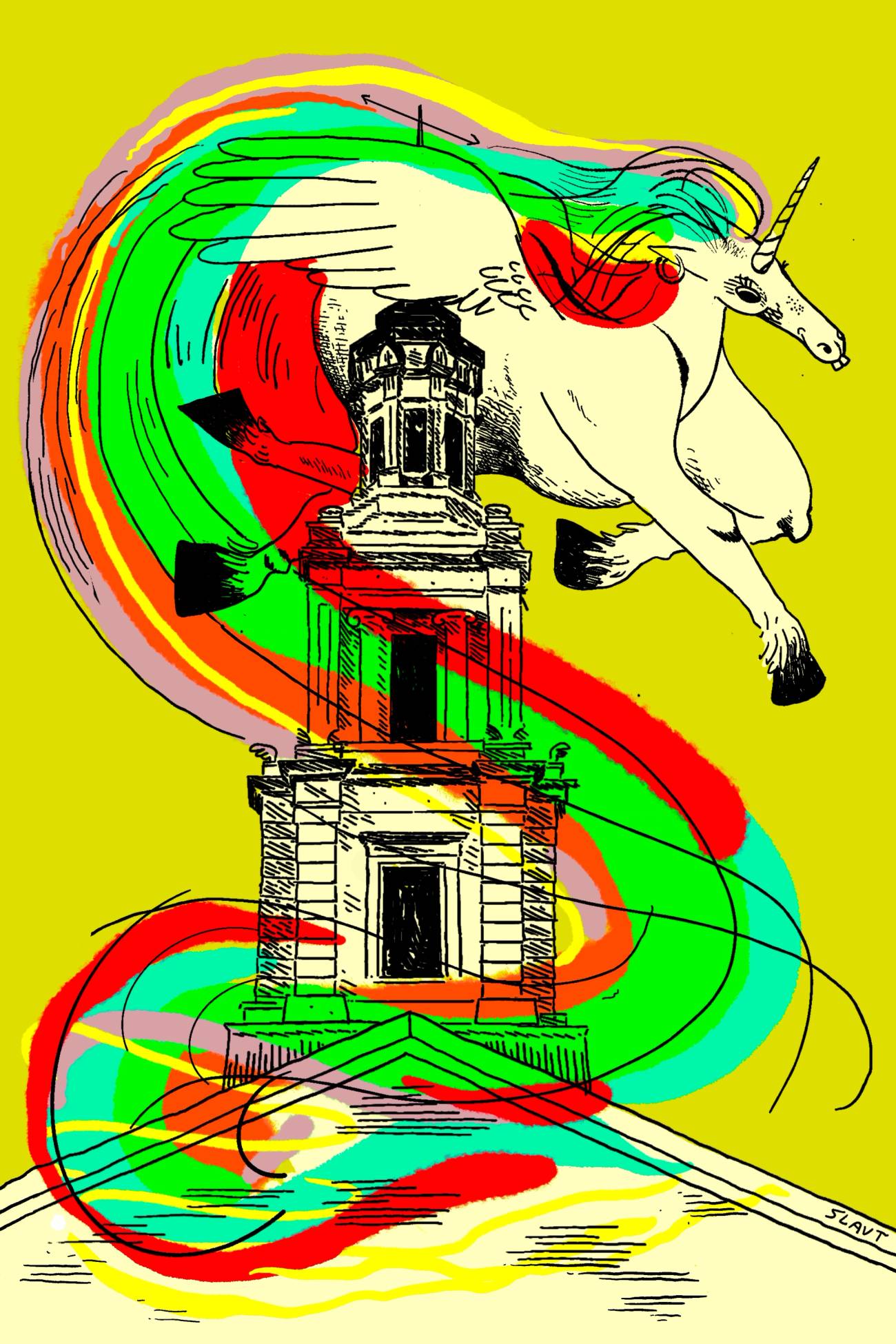The Church at the Beach
Provincetown’s Unitarian Universalists maintain their progressive traditions in a historic building in the middle of a popular LGBTQ resort town in Massachusetts




The original landing site of the Pilgrims, Provincetown, Massachusetts, is today better known as an LGBTQ-friendly beach town. Its seaside New England charm was evident even on a damp, chilly Pride Weekend earlier this month as tourists, couples both gay and straight, bachelorette parties, drag queens, and people in fetish wear milled around Commercial Street. Here, in the bustling center of the town’s busiest and most tourist-oriented thoroughfare, is where the Unitarian Universalist Meeting House of Provincetown is located, a pristine white church built in 1847 that, despite its very traditional exterior, propounds very progressive theology and politics.
A pamphlet titled “Belief and Belonging” can be found in the foyer of the Meeting House, explaining that Unitarian Universalist beliefs designate the individual as the “ultimate religious authority,” which means that “the answer to the question, ‘What do I have to believe to belong here?’ is ‘what you already believe in your heart and soul now.’”
“Belief and Belonging” denies that “a lack of strongly stated, shared beliefs” makes Unitarian Universalism rootless. Rather, they point to their roots in Christianity, as well as their openness to other religions and spiritualities and their traditions, as a way to discover unity in diversity. Unitarian Universalism can include not only liberal Christians and Buddhists, but rationalists, pagans, and even atheists and agnostics.
That Unitarian Universalism traces its roots to the Pilgrim Fathers may come as something of a surprise, but it is a paradox that Provincetown embraces. Along Commercial Street, pedestrians pass Standish Street, and a restaurant named for Gov. Bradford that hosts drag karaoke. Jutting 60 miles out into the Atlantic, Provincetown is the site of Long Point, the peninsular bit of Massachusetts that curls upward (“Just the tip,” as the T-shirts cheekily have it). It is visible from the marshland where the Pilgrims coming from Holland first landed and drew up the Mayflower Compact, the self-governing agreement that both the religious separatists and “strangers” (their fellow settlers with nonreligious motivations), would abide by while far from the gaze of the English monarchy.
The coastal location means that the omnipresent rainbow flags and windsocks are nearly always fluttering. Also catching the brisk sea breeze when I visited in early June was a banner, tied to the fence in front of the UU Meeting House, for Womxn of Color, an annual Pride Weekend retreat for LGBTQ+ people who identify as either cisgender or transgender women, nonbinary, or gender-fluid, with the aim to increase the representation of people of color in Provincetown. Registration for the event was taking place inside the Meeting House. Just a short distance from Pilgrims First Landing Park, in a church founded by the Pilgrims’ spiritual descendants, LGBTQ+ people of color were hosting a vendor fair featuring adult novelty retailer House of Bawdy. It is easy to forget, given their caricature in the American national imagination as censorious killjoys, that the New England Puritans were in fact radicals. Provincetown, a Portuguese fishing village-turned-artist-colony-turned-gay-friendly tourist spot, is a consequential reminder.
Unitarianism and Universalism both developed as an outgrowth of the New England Puritans’ wrestling to reconcile their Calvinism with Enlightenment principles.
Unitarians, who disbelieved in the Christian doctrine of the Trinity (the idea that God, Jesus Christ, and an animating spiritual force called the Holy Spirit are all one), and Universalists, who did not believe in the doctrine of hell, merged in 1961 to create the Unitarian Universalist Association (UUA). But prior to that, Unitarian Universalism’s origins are almost as unlikely as its history in Provincetown itself. (Enthusiasm for Universalism spread there in the 1820s, after one family shared the soggy biography of a Universalist minister that their children had discovered washed up on the beach.)
Unitarianism had existed in different flavors since the dawn of the Reformation in Poland and Transylvania. With the English Reformation and the advent of Puritanism, a strain of dissent from the Anglican Church came to reject Trinitarianism, taking a strictly literal understanding of Christian scripture, and coming to believe that Christ was subordinate to, rather than a co-equal being with, God. In 1648—the same year the Treaty of Westphalia established noninterference in the affairs of autonomous states—65 congregations in Massachusetts signed their own agreement of self-determination, the Cambridge Platform, which provided for independent, lay-governed congregations, free from outside clerical interference. The signees were all Calvinists, and so perhaps as a consequence, considerations of doctrine took a back seat to the nuts and bolts of administration and governance. Over time, one thing (the First and Second Great Awakenings) led to another (Transcendentalism), and contentious questions of original sin and salvation were resolved by the more progressive congregations, which had become some shade of Unitarian or Universalist in character as the 19th century progressed. These decided to dispense with the doctrines altogether, and to root their spirituality in individual reason and experience.
Provincetown’s prim-looking UUA Meeting House, with its demure lawn and Greek revival façade, is not an anomaly in this progressive town. Rather, it is a near-perfect metaphor for the town’s synthesis of old-fashioned charm and liberal politics.
Unitarianism gained popularity in liberal Congregationalist communities throughout the 18th century. These eventually broke away from the more conservative wing of Congregationalism to form the American Unitarian Association in 1825. Meanwhile, American Universalism began developing in earnest with the arrival of Englishman John Murray, who founded the first Universalist church in Gloucester, Massachusetts, in 1780 (it was his biography that the girls in Provincetown had discovered on the beach). Universalists rejected the Calvinist belief in predestination, that salvation was for a group of “elect,” and instead believed that all humanity was “saved” from eternal damnation. Their leaders were eventually brought over to a more Unitarian theology, and by 1935, under the influence of theologian Clarence Skinner, Universalists had dispensed with traditional Christian notions of salvation altogether, shifting to a humanistic emphasis on universal human experience and unifying themes, adopting the “Bond of Fellowship,” which downplayed Jesus’ divinity, and put its faith “in the power of men of goodwill and sacrificial spirit to overcome evil and progressively establish the Kingdom of God.”
While both churches were open to the wisdom traditions and beliefs of other world religions and cultures, they had their differences. “The Universalists put more stress on the love and grace of God, and the Unitarians put more stress on man’s natural goodness,” according to a 1975 UUA pamphlet reflecting on the 1961 merger. Nevertheless, the synergy between the two theologically and socially progressive churches gathered apace from the Civil War onward, with a series of interdenominational congresses and conferences that occurred nearly every decade after bringing the two closer and closer to a formal union. Today, according to the Unitarian Universalist Association’s own history, 21 of the original 65 congregations that signed the Cambridge Platform belong to the Unitarian Universalist Association.
After Unitarianism and Universalism joined forces in 1961, a UUA survey conducted a few years later found that over 80% of their members thought homosexuality should be discouraged. However, attitudes changed quickly. By 1970, the UUA’s governing body, the General Assembly, had voted to end discrimination against homosexuality, and for the creation of a sex ed program that would acknowledge and encourage acceptance of different sexualities. The 1970s and ’80s saw the UUA adopt a variety of initiatives to affirm gay members within its ranks, from establishing an Office of Gay Affairs, working to end discrimination against people with AIDS , and recognizing its first openly gay clergy member, as well as developing a program to help congregations welcome and include gay members. UUA leadership voiced support throughout the 1990s on hot-button issues: the repeal of “don’t ask, don’t tell” in the military, the legalization of same-sex marriage, and an end to discriminatory policies against homosexuality in the Boy Scouts of America. In 2004, the then-president of the UUA officiated at the wedding of the two women who were lead plaintiffs in Goodridge v. Massachusetts Department of Public Health, the case that led to Massachusetts being the first state to legalize same-sex marriage. He conducted the marriage at Eliot House, the former Beacon Street UUA headquarters in Boston, named for former American Unitarian Association president and Boston Brahmin Samuel Eliot—a relation of T.S. Eliot, himself the grandson of a Unitarian minister.
In 2014, the UUA added to its bylaws a pledge to replace “with ever-widening circles of solidarity and mutual respect” the “barriers for persons and groups with particular identities, ages, abilities, and histories,” by “structuring congregational and associational life in ways that empower and enhance everyone’s participation.”
Another pamphlet in the Provincetown Meeting House foyer, “A Spiritual Home for LGBTQ People,” lists various life situations in which seekers may find themselves: divorced lesbian with two transracially adopted children, a transgender woman of color who has been rejected by friends and family, a teenager “looking for other queer young adults to connect with on a deeper level,” a middle-aged bisexual man who has lost a partner to HIV/AIDS complications, or someone with a same-sex partner whose immigration status is threatened. “You are welcome in Unitarian Universalism,” the pamphlet says after each scenario. Today, UUA congregations hold services and participate in events surrounding Pride, National Coming Out Day, and Transgender Day of Remembrance.
Rummaging among the materials in the Meeting House foyer, I come across a quote from retired UUA minister Rev. Barbara Merritt: “Unitarian Universalists have said for centuries that there is room in our religion for all seekers. Skeptics and poets and scientists are welcome here, as are nonconformists and shy and uncertain folk. We believe that restlessness and doubts are a sign of grace, that the love of truth is the holiest of gifts.” Provincetown itself certainly echoes this embrace of diversity: Various languages could be heard everywhere during the day I spent there. I didn’t even see anyone confront the guy in the “Let’s Go Brandon” hat, who as far as I can tell, was left in peace to browse puzzles and board games at a bustling hobby shop.
The crowd was picking up as I prepared to leave in the late afternoon. Outside Town Hall, a stately Victorian festooned with rainbow bunting that spilled out in defiance of the gray exterior conditions, a line was forming, presumably for the Pride rally that had been moved indoors due to weather. I left as I arrived, by bus, the ferry having been canceled out of concern for the wind. The cold and rain had done apparently little to dampen the spirits of the college students who’d joined me on the two-hour bus ride from Boston, though, who laughed and talked nearly the whole way, and braided rainbow scarves into each other’s hair en route. As I waited to depart in the afternoon, I saw group after group of people laughing and hugging. Some were rainbow-clad, others were more excitingly and scantily dressed (I worried for their comfort and well-being as the temperature continued to drop), but many others were neither.
Built almost two centuries ago by off-duty fishermen to accommodate a growing congregation, today it serves a membership of 112. Provincetown’s prim-looking UUA Meeting House, with its demure lawn and Greek revival façade, is not an anomaly in this progressive town. Rather, it is a near-perfect metaphor for the town’s synthesis of old-fashioned charm and liberal politics. Its ostensible clash of traditional aesthetics and individualistic theology is less of a contradiction than a manifestation of Unitarian Universalism’s unique worldview: at once thoroughly Yankee and thoroughly radical.
Maggie Phillips is a freelance writer and former Tablet Journalism Fellow.